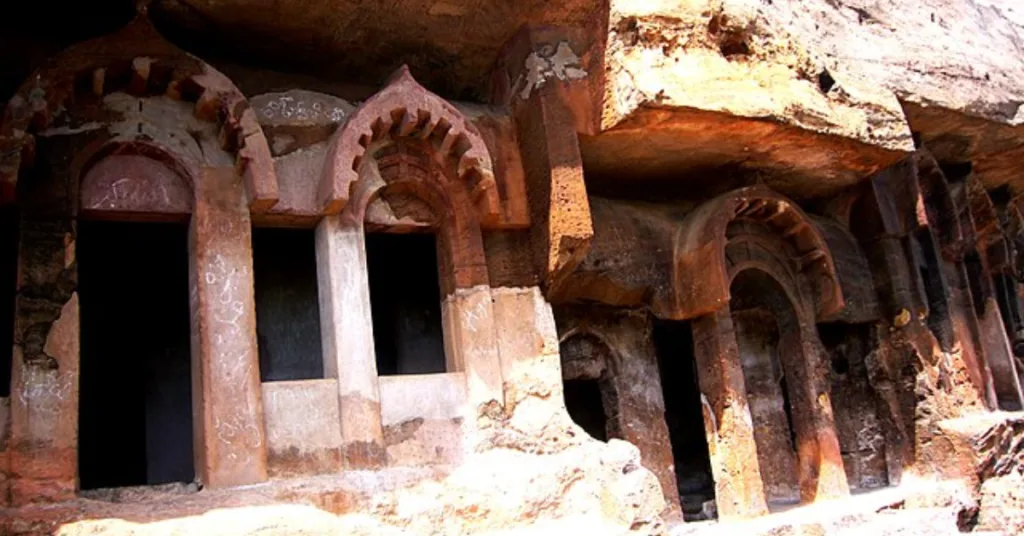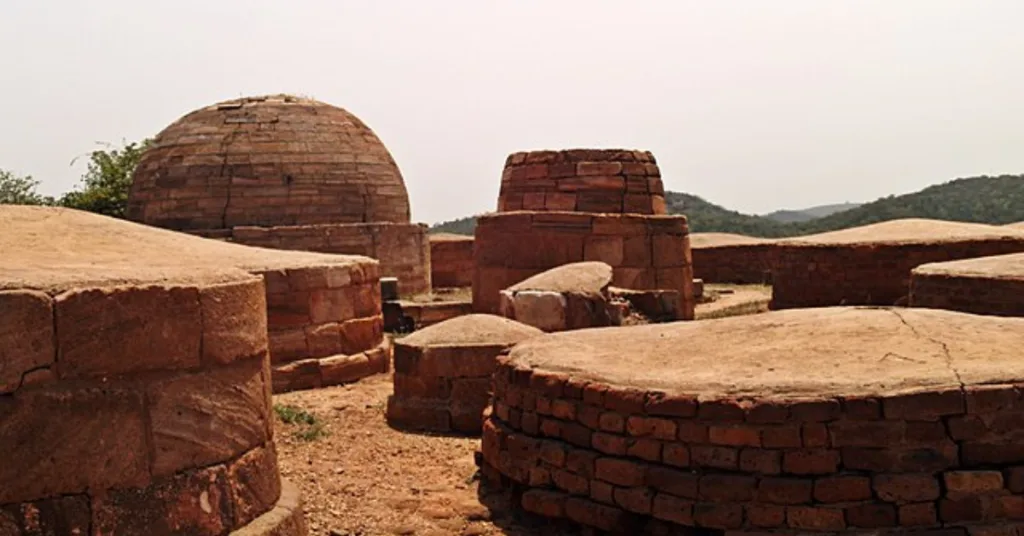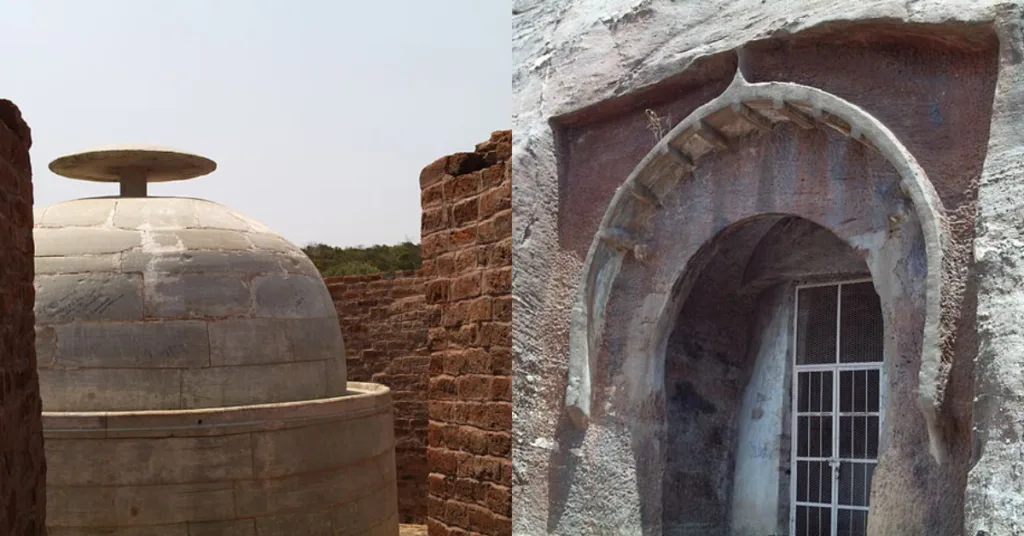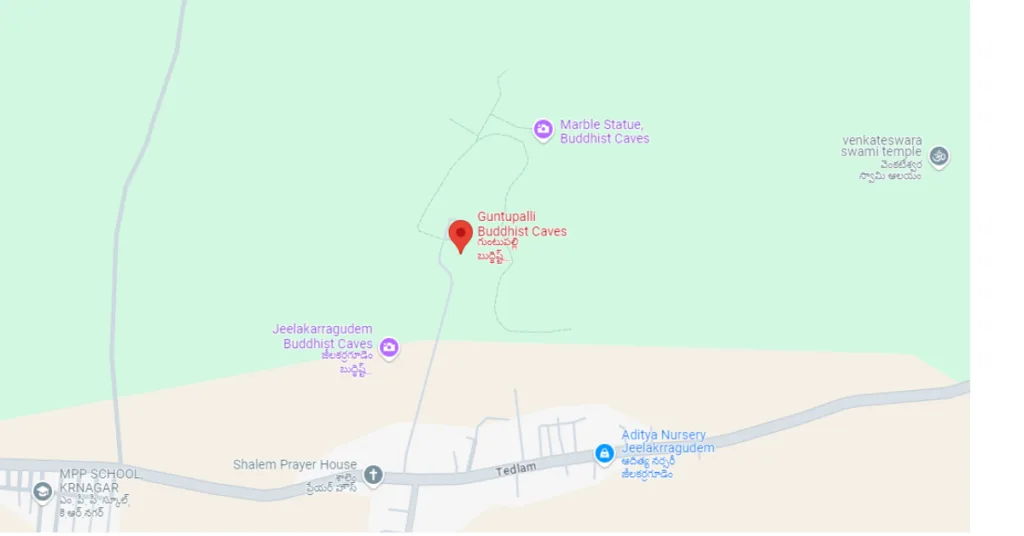Introduction:
The Guntupalli Buddhist Caves, also known as the Guntupalli Buddhist Temples, are an ancient and historically significant site located near the town of Jilakarragudem in the West Godavari district of Andhra Pradesh. Despite their popular name, the caves are not directly in Guntupalli but are adjacent to this town. These caves showcase the influence of Buddhism in Andhra Pradesh, a region where Buddhist traditions have thrived since the time of the Buddha.

Historical Significance of the Guntupalli Buddhist Caves:
Dating back to the 3rd century BCE, the Guntupalli caves are among the oldest Buddhist shrines in India. The site is particularly important for understanding the early history of Buddhism in the region. The structures found here provide insight into the lives of Buddhist monks and the architectural styles of that period. The Chaitya at this site is believed to date back to the 3rd-2nd centuries BCE, making it one of the oldest in India. This cave features a stupa surrounded by a circular pathway, with intricately carved arches adorning the top, resembling the famous Sudhama and Lomas Rishi Caves in Bihar.
Also read: Exploring Salihundam: A Hidden Gem of Buddhist Heritage in Srikakulam
Architectural Features of the Guntupalli Caves:
The Guntupalli site features a complex of caves that people dug into the sandstone hills to serve as residences for Buddhist monks. The rounded windows connect the caves, allowing light and air to flow freely into the interiors. Rainwater flows through rock-carved canals during the rainy season, keeping the caves dry. Around sixty stupas of various shapes, mostly round, dot the top of the hill, built on platforms made of stone or brick. Among these is the notable Mokubadi Chaitya, a structure dating back to the 2nd century BCE. Stone slabs cover this stupa, and excavation has revealed its ancient origins.
Unique Features of the Site:
The Chaitya Griha, measuring 17.6 meters in length and 4.42 meters in width, is one of the most notable features of the Guntupalli Caves. Statues of Buddha and Bodhisattva adorn the entrance, and the intricate carvings resemble those in the Nasik and Karla Caves in Maharashtra. The Brick Stupa Chaityamu, another structure at the site, dates back to the 3rd-2nd century BCE. A worshiper built the staircase leading to this stupa on the plateau during the 2nd century BCE. The surrounding pathway measures 1.8 meters in width, allowing worshippers to walk around the stupa.

Also read: Bojjana Konda A Hidden Gem of Buddhist Art and Architecture
Inscriptions and Historical Records:
A recent discovery in the Guntupalli caves complex is an inscription in Brahmi script, believed to date back to the early centuries of the Christian era. Written in the Prakrit language, the inscription mentions a donation made by a Buddhist monk named Midilakudu to the monks residing in the Guntupalli Caves. This find has shed light on several historical aspects of the site and its importance in early Buddhist history.
Visiting Guntupalli Buddhist Caves: Timings and Entry:
- Timings: The Guntupalli Caves are open from 09:00 AM to 05:00 PM daily.
- Entry Fee: The site is open to visitors for free.
- Duration of Visit: Visitors typically spend around 1-2 hours exploring the caves and their surroundings.
Also read: Bavikonda Exploring the Rich Heritage of an Ancient Buddhist Monastery
How to Reach Guntupalli Buddhist Caves:
- By Air: The nearest airports are Rajahmundry Airport (approximately 95.6 km away) and Vijayawada Airport (85 km away).
- By Train: The closest railway station is Eluru Railway Station, situated about 40 km from the site.
- By Bus: Visitors can take a bus to Eluru, which is 37 km from the caves.

Also read: Thotlakonda Buddhist Complex: An Exclusive History One of Vizag
Location and Address:
The Guntupalli Caves are located at the Group of Buddhist Monuments, Approach Road for Buddhist Caves, Jeelakarragudem, West Godavari District, Andhra Pradesh 534467, India.

Other Sites to Explore Nearby:
While visiting the Guntupalli Buddhist Caves, you may also want to explore other significant temples and landmarks in the region, such as the Sri Malyadri Narasimha Swamy Temple and the Sri Durga Malleswara Swamy Temple on Indrakeeladri.
These caves are a must-visit for history enthusiasts and those interested in the ancient Buddhist heritage of Andhra Pradesh. Plan a visit to experience the serenity and historical richness of this ancient Buddhist site!
Also read: Exclusive the Buddhist Heritage of Nandikonda
Conclusion:
The Guntupalli Buddhist Caves offer a remarkable glimpse into the ancient Buddhist heritage of Andhra Pradesh, showcasing impressive architecture and historical inscriptions from the early centuries. Travelers can experience the serene and spiritual atmosphere that has been preserved for centuries when they visit this site. History enthusiasts and cultural explorers will find the Guntupalli Caves a unique and enriching experience that they shouldn’t miss.
Frequently Asked Questions (FAQs):
Answer: The ancient Buddhist rock-cut caves.
Answer: Guntupalli, East Godavari district, Andhra Pradesh.
Answer: Believed to date back to the 1st or 2nd century CE, they offer a glimpse into early Buddhist architecture and art.
Answer: Carvings, sculptures, and inscriptions related to Buddhism.
Answer: During the winter months (October to February) when the weather is pleasant.
Answer: Yes, follow the guidelines set by the Archaeological Survey of India.
Answer: By road from nearby cities like Rajahmundry or Kakinada.
Answer: Yes, there are hotels and lodges in the nearby areas.











